CApacity development and skills enhancement
Capacity building refers to the process of developing and strengthening the skills, knowledge, resources, and abilities of student communities to effectively achieve their goals and objectives in J B Institute of Technology. When it comes to consistency, capacity building plays a crucial role in promoting and maintaining it. Here’s how capacity building leads to consistency in our Organization:
1. Knowledge and skills development: Capacity building initiatives often focus on enhancing the knowledge and skills of our organizations. By providing training, workshops, and educational resources, capacity building programs enable students to acquire the necessary expertise to perform their tasks consistently and effectively. When people have the right knowledge and skills, they are more likely to achieve consistent results in their work.
2. Standardization and best practices: Capacity building efforts often involve promoting standardized procedures and best practices within an organization or community. This helps establish a common set of guidelines and processes that contribute to consistency in how tasks are performed. By disseminating and implementing best practices, capacity building fosters a culture of consistency and quality across various areas of operation.
3. Improved systems and processes: Capacity building also focuses on strengthening systems and processes within our organization. This includes enhancing infrastructure, streamlining workflows, and optimizing procedures to ensure smooth operations. By improving these systems and processes, capacity building facilitates consistency by eliminating bottlenecks, reducing errors, and promoting efficient and reliable performance.
4. Leadership and governance: Effective leadership and governance are vital for consistency within our organization. Capacity building initiatives often include leadership development programs that empower individuals with the skills and knowledge needed to lead effectively. Strong leadership promotes a clear vision, fosters accountability, and sets the tone for consistent performance throughout the organization.
5. Monitoring and evaluation: This emphasizes the importance of monitoring and evaluating progress and outcomes. By implementing robust monitoring and evaluation mechanisms, we can identify areas of improvement, track performance, and ensure consistency in achieving goals. Regular assessment and feedback help identify deviations from desired outcomes, allowing for timely adjustments and corrective actions to maintain consistency.
In overall, capacity building provides the necessary foundation for consistency by focusing on knowledge and skills development, promoting standardization and best practices, improving systems and processes, fostering effective leadership, and implementing monitoring and evaluation mechanisms. Through these efforts, capacity building strengthens our student communities, leading them to consistent and sustainable results.
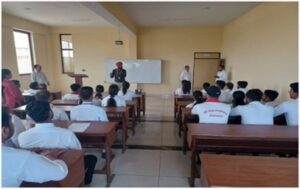
REPORT | |
Title | Role of Networking and Relationship Building |
Type of Activity | Capacity development and skills enhancement activities |
Date | 15th to 18th March 2023 Time: (From 10:30 AM To 11:30 AM) |
Venue | Swami Vivakanand Hall, JBIT |
Organized by | Training & Placement Department |
Resource Person | Mr. Harmohan Singh (ASM- AU Small Bank) |
Participated by | B.Tech Final Year |
No of Students Participated | 141 |
Program Objective | “Networking and Relationship Building” program is to equip individuals with the necessary skills, knowledge, and mindset to establish and nurture relationships that contribute to their professional success, career advancement, and overall well-being. |
Program Outcome | Students acquired the ability to initiate conversations, make introductions, and establish rapport with peers, professors, professionals, and industry experts. They learned how to effectively network in various settings, such as career fairs, industry events, and social gatherings. |
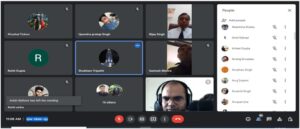
REPORT | |
Title | Role of technology in the current HR work |
Type of Activity | Capacity development and skills enhancement activities |
Date | 8th to 9th September 2022 Time: (From 10:30 AM To 11:30 AM) |
Venue | Virtual (Online Session) |
Organized by | Training & Placement Department |
Resource Person | Mr. Shubam Tripathi – (Campus Head APAC- Zee Media Ltd) |
Participated by | B.Tech Final Year |
No of Students Participated | 141 |
Program Objective | How to get ready for a corporate world, kind of skills required now for getting hired and the role of technology in the current HR functions |
Program Outcome | · Latest technology and the importance of data analytics in the HR role. · How to face interview in the technology driven HR Era · Students were motivated for their future interview |
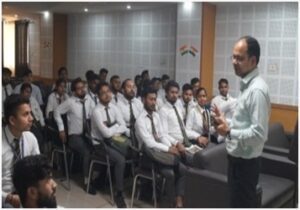
REPORT | |
Title | Role of “Effective Communication Skills” |
Type of Activity | Capacity development and skills enhancement activities |
Date | 23rd to 25th March 2022 Time: (From 11:00 AM To 12:00 PM) |
Venue | Swami Vivekanand Hall, JBIT |
Organized by | Training & Placement Department |
Resource Person
| Mr. Vikas Chamoli (Head- T&P, JBIT Dehradun) |
Participated by | B.Tech Final Year |
No of Students Participated | 142 |
Program Objective | “Effective Communication Skills” is to develop and enhance students’ ability to communicate clearly, confidently, and persuasively in various personal and professional contexts. |
Program Outcome | · By improving their communication skills, students become better equipped to succeed academically, professionally, and personally. · They got the confidence to express themselves and performed well during campus drive.
|
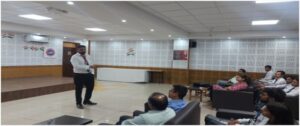
REPORT | |
Title | Role of Team Work and Collaboration |
Type of Activity | Capacity development and skills enhancement activities |
Date | 25th to 27th November 2021 Time: (From 10:30 AM To 11:30 AM) |
Venue | Swami Vivakanad Hall, JBIT |
Organized by | Training & Placement Department |
Resource Person | Mr. Satish Kumar (HR- Frontier Alloy Steel) |
Participated by | B.Tech Final Year |
No of Students Participated | 142 |
Program Objective | Students will develop and enhance their skills in various aspects of teamwork and collaboration. This includes effective communication, active listening, conflict resolution, cooperation, problem-solving, decision-making, and adaptability within team settings. |
Program Outcome | The program aims to enhance students’ employability by equipping them with essential teamwork and collaboration skills sought by employers. By developing these skills, students become more attractive to potential employers who value individuals capable of working effectively in team settings. |

REPORT | |
Title | Problem Solving and Decision Making |
Type of Activity | Capacity development and skills enhancement activities |
Date | 17th September 2020 Time: (From 11:00 AM To 12:00 PM) |
Venue | Virtual |
Organized by | Training & Placement Department |
Resource Person | Mr. Atish Kumar (HR- Aloha Technology) |
Participated by | B.Tech final year |
No of Students Participated | 190 |
Program Objective | The objective of a program on “Problem Solving and Decision Making” is to equip students with the skills, knowledge, and techniques necessary to effectively identify, analyze, and solve problems, as well as make sound decisions in various personal and professional contexts |
Program Outcome | Students developed the ability to effectively identify problems, analyze their root causes, and apply appropriate problem-solving techniques to generate innovative and practical solutions. |

REPORT | |
Title | Stress Management in Covid Era |
Type of Activity | Capacity development and skills enhancement activities |
Date | 3rd February 2021 Time: (From 11:00 AM To 12:00 PM) |
Venue | Virtual |
Organized by | Training & Placement Department |
Resource Person | Ms. Manisha Maiduly (Head-Training & Placement, JBIT, Dehradun) |
Participated by | B.Tech Final Year |
No of Students Participated | 190 |
Program Objective | The program will help students understand the psychological and emotional impact of the Covid-19 pandemic on their well-being. It will provide information about common stressors and challenges faced during this time, such as uncertainty, social isolation, academic pressures, health concerns, and disrupted routines. |
Program Outcome | Students developed the skills to cope with stress effectively, reducing the negative impact of stress on their overall mental health. This improvement in mental well-being can positively impact their performance in training programs and job placement processes. |
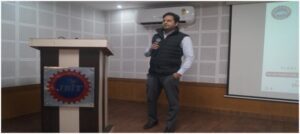
REPORT | |
Title | How to cope up the situation- Emotional Intelligence |
Type of Activity | Capacity development and skills enhancement activities |
Date | 4th to 6th November 2019 Time: (From 11:00 AM To 12:00 PM) |
Venue | Swami Vivakanad Hall, JBIT |
Organized by | Training & Placement Department |
Resource Person | Mr. Vivek Sharma ( HR- Honeywell) |
Participated by | B.Tech Final Year |
No of Students Participated | 162 |
Program Objective | The objective of the program “How to Cope with Emotional Situations – Emotional Intelligence” for students is to help them develop and enhance their emotional intelligence skills to effectively manage and cope with various emotional situations they may encounter in their academic, personal, and social lives. |
Program Outcome | Students developed resilience and the ability to bounce back from setbacks and challenges. They learn to view failures as opportunities for growth and develop a mindset that embraces challenges and change, leading to increased adaptability and perseverance. |
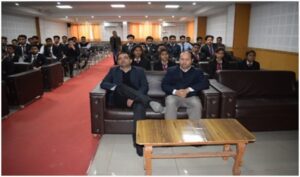
REPORT | |
Title | Presentation Skills |
Type of Activity | Capacity development and skills enhancement activities |
Date | 27th to 28th February 2020 Time: 10:30 AM to 11:30 AM |
Venue | Swami Vivakanand Hall, JBIT |
Organized by | Training & Placement Department |
Resource Person | Mr. Manoj Chaudhary (HOD-CSE, JBIT, Dehradun) |
Participated by | B.Tech Final Year |
No of Students Participated | 162 |
Program Objective | The program objective of “Presentation Skills for Students” is to equip students with the necessary knowledge, techniques, and confidence to deliver effective presentations. The program aims to enhance their communication skills, public speaking abilities, and overall presentation delivery in various academic and professional settings |
Program Outcome | – Students who have participated in the program experienced a boost in their confidence levels when it comes to presenting in front of an audience. – This helped students to perform well during the campus drive. |
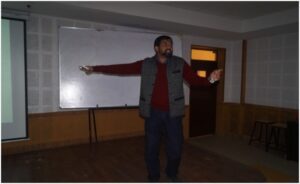
REPORT | |
Title | Conflict Resolution and Negotiation |
Type of Activity | Capacity development and skills enhancement activities |
Date | 28th to 30th March 2019 Time: (From 11:30 AM To 12:30 PM) |
Venue | Swami Vivakanad Hall, JBIT |
Organized by | Training & Placement Department |
Resource Person | Mr. Anil Kumar ( Manager- Tirupati Group) |
Participated by | B.Tech Final Year |
No of Students Participated | 138 |
Program Objective | The program objective of “Conflict Resolution and Negotiation” for students is to equip them with the necessary knowledge, skills, and techniques to effectively manage and resolve conflicts in various settings, while also developing their negotiation abilities. |
Program Outcome | Students possess the ability to handle conflicts and negotiate effectively, making them desirable candidates for roles that involve team management, client interactions, project coordination, and leadership positions. |
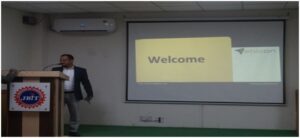
REPORT | |
Title | Time Management |
Type of Activity | Capacity development and skills enhancement activities |
Date | 19th to 21th September 2018 Time: (From 11:00 AM To 12:00 PM) |
Venue | Swami Vivakanad Hall, JBIT |
Organized by | Training & Placement Department |
Resource Person | Mr. Rajat Negi (Director- Ebizon) |
Participated by | B.Tech Final Year |
No of Students Participated | 138 |
Program Objective | The program objective of “Time Management” for students is to help them effectively manage their time in order to maximize productivity, achieve academic success, reduce stress, and maintain a healthy work-life balance. The program aims to teach students the skills and strategies necessary to prioritize tasks, set goals, and make efficient use of their time. |
Program Outcome | Students who effectively manage their time are more likely to meet deadlines, complete assignments on time, and engage in focused and productive studying. This can lead to higher grades, increased learning outcomes, and a greater sense of accomplishment. |
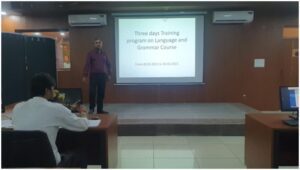 REPORT
REPORT
Event Name | Language and Grammar Courses |
Date | 28.03.2023 to 30.03.2023 |
Venue | Language Lab |
Participated by | 112 |
Programme Coordinator | Dr. Sandeep Kumar Chaudhary |
Programme Objective | The program’s objective of “Language and Grammar Courses”for students isto develop a strong command of the English language, including vocabulary, syntax, and idiomatic expressions, to enable clear and effective communication. Learn to produce well-structured, coherent, and grammatically correct written texts, suitable for various contexts such as essays, reports, and business correspondence. |
About Event | Language and grammar courses provide students with the tools they need to communicate effectively, succeed academically and professionally, think critically, and engage meaningfully with the world around them. The program will start with foundational concepts and gradually progress to more advanced topics. Each day students will participate in theoretical discussions, interactive activities, group exercises, and opportunities for participants to practice and apply their learning. In response, JB Institute of Technology conducted a training programon Language and Grammar Courses from 28.03.2023 to 30.03.2023
Day 1 · Importance of grammar in effective communication · Overview of key grammatical concepts · Nouns, pronouns, verbs, adjectives, adverbs, prepositions, conjunctions, interjections · Simple, compound, and complex sentences · Matching subjects with appropriate verb forms Day 2 · Clarity and conciseness in writing · Coherent paragraph and essay structure · Commas, semicolons, colons, dashes, quotation marks · Avoiding comma splices and other punctuation errors · Creating balanced and grammatically consistent writing Day 3 · Gerunds and infinitives · Subjunctive mood · Conditional sentences · Strategies for expanding and enhancing vocabulary · Common grammatical errors to watch for · Review of key concepts from the course · Addressing participant questions and concerns |
Programme Outcome | Students will leave the course with improved language and grammar skills, enabling them to communicate more confidently, accurately, and effectively in various personal, academic, and professional contexts. |
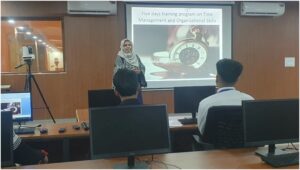 REPORT
REPORT
Event Name | Training program on Time management and organizational skills |
Date | 11.10.2022 to 15.10.2022 |
Venue | Swami Vivekananda Auditorium |
Participated by | 112 |
Programme Coordinator | Dr. Sandeep Kumar Chaudhary |
Programme Content | Language and Communication Skills |
Programme Objective | To educate students about the importance and technique of time management. |
About the Program | Time management and organizational skills are critical for success in both personal and professional life. To equip individuals with these skills, an institution conducted a five-day training program on time management and organizational skills from 11.10.2022 to 15.10.2022. The program aimed to educate the participants on the importance of time management and organizational skills and provide them with the necessary tools and techniques to improve their productivity and efficiency. The training program was conducted over five days, from 3 am to 4:30 pm every day. The program included lectures, group activities, and practical exercises to reinforce the importance of time management and organizational skills. The program covered a wide range of topics related to time management and organizational skills. The topics included: Day 1: · Introduction to time management and organizational skills · Understanding the importance of time management and organizational skills in personal and professional life · Identifying common time wasters and barriers to effective time management · Setting goals and priorities · Creating a personal time management plan Day 2: · Understanding the principles of effective time management · Identifying and managing distractions · Developing strategies to handle interruptions · Effective scheduling techniques · Creating a schedule that works for you
Day 3: · Understanding the importance of effective communication · Developing effective communication skills · Identifying and managing communication barriers · Developing effective email management skills · Managing information overload Day 4: · Understanding the principles of effective organizational skills · Developing organizational skills · Identifying and managing clutter · Developing effective filing systems · Managing digital clutter Day 5: · Understanding the principles of effective goal setting · Setting realistic and achievable goals · Developing action plans to achieve goals · Managing and tracking progress · Celebrating successes and learning from failures The training program on time management and organizational skills conducted by the institution was well-organized and effective in educating the participants on the importance of time management and organizational skills. The program provided a safe and supportive environment for participants to learn and practice the necessary skills. Overall, the program was successful in promoting the importance of time management and organizational skills and equipping participants with the necessary knowledge and tools to improve their productivity and efficiency. |
Programme Outcome | Students obtained training on the various techniques of time management. |
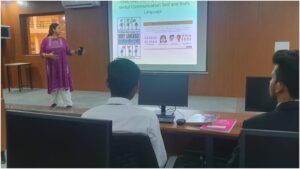 REPORT
REPORT
Event Name | Training program on Nonverbal communication and body language |
Date | 23.03.2022 to 25.03.2022 |
Venue | Language Lab |
Organized by | JB Institute of Technology |
No. of Participants | 145 |
About the Program | Nonverbal communication and body language are important components of effective communication that are often overlooked. To address this gap, Institution conducted a five-day training program on nonverbal communication and body language from 23.03.2022 to 25.03.2022. The program aimed to educate participants on the importance of nonverbal communication and body language and equip them with the necessary tools and techniques to communicate effectively using these skills. The program included lectures, group activities, and practical exercises to reinforce the importance of nonverbal communication and body language. Program Content: · Introduction to nonverbal communication and body language · Understanding the different types of nonverbal communication · Developing observation skills to interpret nonverbal communication · Understanding the cultural differences in nonverbal communication · Understanding the different types of body language · Developing awareness of your own body language · Understanding facial expressions and their meanings · Developing facial expressions to convey different emotions · Understanding the importance of eye contact in communication · Understanding the importance of gestures in communication · Developing effective gestures to support verbal communication · Understanding the importance of posture in communication · Developing effective posture to convey different messages · Understanding the importance of tone of voice in communication · Developing effective tone of voice to convey different emotions · Understanding the importance of touch in communication The training program on nonverbal communication and body language conducted by the Institution was well-structured and informative. The program provided a comprehensive understanding of the importance of nonverbal communication and body language in effective communication. The practical exercises and group activities helped participants to develop their skills and apply the knowledge they had gained. The program was successful in promoting the importance of nonverbal communication and body language and equipping participants with the necessary knowledge and tools to communicate effectively using these skills. |
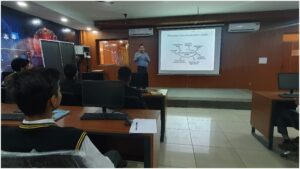 REPORT
REPORT
Event Name | Training program on Effective communication skills for academic and professional success |
Date | 05.10.2021 to 07.10.2021 |
Venue | Swami Vivekananda Auditorium |
Participated by | 145 |
Programme Coordinator | Mr. SumitKumar |
Programme Content | Language and Communication Skills |
Programme Objective | To educate students about the importance and technique of time management. |
About Program | Effective communication skills are essential for academic and professional success. To equip individuals with these skills, an institution conducted a three-day training program on effective communication skills for academic and professional success from 05.10.2021 to 07.10.2021. The program focused to educate the participants on the importance of effective communication skills and provide them with the necessary tools and techniques to communicate effectively in academic and professional settings. The program covered a wide range of topics related to effective communication skills. The topics included: Day 1: · Introduction to effective communication skills · Understanding different communication styles · Developing active listening skills · Developing assertive communication skills · Building rapport and establishing trust in communication Day 2: · Understanding the importance of nonverbal communication · Developing effective written communication skills · Developing effective verbal communication skills · Communicating effectively in meetings and presentations · Developing effective negotiation skills Day 3: · Understanding the importance of cross-cultural communication · Developing effective intercultural communication skills · Developing effective communication in conflict resolution · Understanding the importance of feedback in communication · Developing effective leadership communication skills The training program on effective communication skills for academic and professional success conducted by the institution was well-organized and effective in educating the participants on the importance of effective communication skills. The program provided a safe and supportive environment for participants to learn and practice the necessary skills. Overall, the program was successful in promoting the importance of effective communication skills and equipping participants with the necessary knowledge and tools to communicate effectively in academic and professional settings. |
Programme Outcome | Students obtained training on the various techniques of time management. |
REPORT
Event Name | Effective Communication Skills |
Date | 08.03.2021 to 10.03.2021 |
Venue | Language Lab |
Participated by | 142 |
Programme Coordinator | Mr. SumitSangwan |
Programme Objective | The objective of the “Effective Digital Communication Skills” training program is to empower students with the knowledge, tools, and practical techniques necessary to communicate clearly, confidently, and persuasively in a variety of personal and professional contexts. The program will encourage active participation, self-reflection, and continuous learning to ensure the successful acquisition and application of effective communication skills |
About Event | EffectiveDigital communication skills are essential for students as they play a crucial role in their academic, personal, and future professional success. Clear communication is fundamental for understanding and expressing complex concepts, ideas, and information in various subjects. Students who communicate effectively can better articulate their thoughts, participate actively in class discussions, and excel in assignments and exams. In response, JB Institute of Technology conducted a training programon Effective communication skills from 08.03.2021 to 10.03.2021 Day 1 · Importance of Effective Communication · Elements of communication · Understanding verbal cues · Body language and gestures · Techniques for active listening · Empathetic listening and rapport building Day 2 · Clarity and Conciseness in Communication · Avoiding communication barriers · Understanding persuasion and its role in communication · Building credibility and trust · Presenting compelling evidence and examples · Handling objections and counterarguments Day 3 · Communication skills for effective leadership · Motivating and inspiring teams through communication · Led productive meetings. · Reflecting on personal communication strengths and areas for growth · Developing an action plan for ongoing skill enhancement · Giving and receiving constructive feedback |
Programme Outcome | By the end of the program, studentswill be able to define the key elements of effective communication, including sender, message, medium, receiver.They will recognize the impact of nonverbal cues, such as body language tone on communication and continuously evaluate and refine communication techniques for ongoing improvement. |
| |
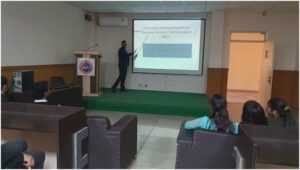 REPORT
REPORT
Event Name | Customer Service Communication Excellence |
Date | 19.10.2020 to 21.10.2020 |
Venue | Language Lab |
Participated by | 142 |
Programme Coordinator | Mr. Sumit Kumar |
Programme Objective | The program’s objective of “Customer Service Communication Excellence”for students isto enhance participants’ customer service communication skills to foster positive customer interactions, build rapport, and deliver exceptional service that drives customer satisfaction and loyalty. |
About Event | Customer service communication emphasizes active listening, empathy, and effective interaction. Incorporating customer service communication excellence into students’ skill sets equips them not only for professional success but also for personal growth and meaningful contributions to their communities and society at large. In response, JB Institute of Technology conducted a training programon Customer Service Communication Excellencefrom 19.10.2020 to 21.10.2020 Day 1 · Importance of effective communication in customer service · Verbal vs. non-verbal communication cues · Active listening techniques and their role in understanding customer needs · The role of empathy in customer interactions · Techniques to establish rapport and create a positive atmosphere · Handling challenging customer emotions with empathy Day 2 · Clear and Professional Verbal Communication · Articulating information clearly and concisely · Using positive language and tone in conversations · Handling difficult conversations while maintaining professionalism · Crafting effective emails, chat messages, and social media responses · Tailoring written communication to various customer preferences · Resolving customer issues through written channels with clarity and courtesy
Day 3 · Identifying sources of customer conflicts and complaints · Strategies to de-escalate tense situations and find solutions · Turning challenging interactions into opportunities for customer satisfaction · Going above and beyond exceeding customer expectations · Personalization and customization of service interactions · Turning satisfied customers into loyal brand advocates |
Programme Outcome | Studentswill emerge from this training program with enhanced customer service communication skills, enabling them to engage with customers more effectively, build strong relationships, manage conflicts, and consistently deliver exceptional service that meets and exceeds customer expectations. |
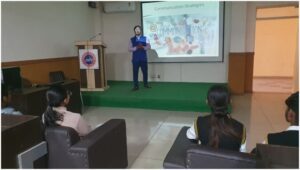 REPORT
REPORT
Event Name | Five days Training Programme on Language Skills: Communication Strategies for Conflict Resolution |
Date | 18.02.2020 to 22.02.2020 |
Venue | Swami Vivekananda Hall |
Participated by | 192 |
Programme Coordinator | Mr. Manoj Kumar Chaudhary |
Programme Content | Cross-Cultural Communication and Diversity |
Programme Objective | To educate students about the Communication Strategies for Conflict Resolution |
About Program | The Institution conducted a five-day training program on communication strategies for conflict resolution from 18.02.2020 to 22.02.2020. The purpose of the program was to equip participants with practical skills and knowledge to handle conflicts effectively in both personal and professional settings. Day 1:The first day of the training program focused on introducing the concept of conflicts, their nature, and the impact they can have on individuals and organizations. The day started with an icebreaker session to help participants get to know each other. This was followed by a lecture on the different conflict management styles, and strategies to prevent conflicts. The day ended with a group discussion on conflicts that participants had encountered in their personal and professional lives. Day 2:The second day of the program focused on effective communication in conflict resolution. The morning session covered active listening, empathetic communication, and nonviolent communication. Participants learned the importance of using these communication strategies in conflict resolution. The afternoon session included role-plays and practical exercises to help participants practice these communication strategies. Day 3:On the third day of the program, participants learned about mediation techniques in conflict resolution. The morning session covered the basics of mediation, its benefits, and its limitations. Participants learned about the role of a mediator and the skills required to be an effective mediator. In the afternoon session, participants practiced mediation techniques in a group exercise. Day 4:The fourth day of the program focused on developing a conflict resolution plan. Participants learned about the importance of having a plan in place before a conflict arises, and the key components of a conflict resolution plan. The afternoon session involved group discussions and practical exercises to help participants develop their own conflict resolution plans. Day 5:The final day of the program focused on reviewing the key concepts covered in the previous days and summarizing the program’s outcomes. Participants shared their experiences and insights gained from the program, and provided feedback on the program’s structure and content. The day ended with a certificate distribution ceremony. The five-day training program on communication strategies for conflict resolution conducted by the Institution was successful in achieving its objectives. The program provided participants with practical skills and knowledge to handle conflicts effectively in their personal and professional lives. The feedback from participants was positive, with many suggesting that the program should be offered to a wider audience. |
Programme Outcome | Students learnt Communication Strategies for Conflict Resolution through this training programme. |
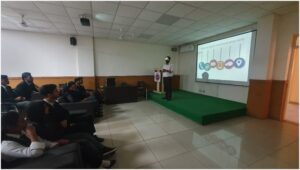 REPORT
REPORT
Event Name | EffectiveDigital Communication skills |
Date | 21.11.2019 to 23.11.2019 |
Venue | Language Lab |
Participated by | 192 |
Programme Coordinator | Mr. Manoj Chaudhary |
Programme Objective | The program’s objective of “Effective Digital CommunicationSkills”for students isto equip them with the essential skills and strategies to communicate effectively in digital environments, including email, social media, and virtual platforms, to enhance professional interactions and build strong online relationships. |
About Event | Effective Digital communication skills empower students to succeed academically, professionally, and personally in a digitalized world. These skills are not only practical but also fundamental for their growth and development in the 21st century. In response, JB Institute of Technology conducted a training programon Effective Digital Communication skillsfrom 21.11.2019 to 23.11.2019 Day 1 · Importance of digital communication in modern professional settings · Differences between digital and in-person communication dynamics · Challenges and opportunities of digital communication · Crafting effective email subject lines and opening sentences · Structuring emails for clarity and impact · Conveying information succinctly in digital messages Day 2 · Tailoring messages for different social media platforms · Engaging with your audience through posts and comments · Managing brand identity and reputation on social media · Best practices for professional online behaviour · Handling disagreements and managing conflicts in digital spaces · Respecting privacy and intellectual property online Day 3 · Preparing for virtual meetings and presentations · Engaging participants and maintaining focus in virtual settings · Overcoming challenges and technical issues in virtual communication · Establishing rapport and connection in virtual interactions · Using visual cues and body language effectively on video calls · Strategies to prevent miscommunication and foster collaboration
|
Programme Outcome | After completing the training program, studentswill possess the skills and knowledge necessary to communicate effectively in various digital contexts. They will be adept at crafting clear and impactful digital messages, navigating social media with professionalism, adhering to online etiquette, excelling in virtual communication, and building robust online relationships. These skills will contribute to improved professional interactions, enhanced brand reputation, and increased effectiveness in digital communication channels. |
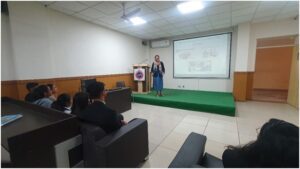 REPORT
REPORT
Event Name | Three days Training Programme on Cross-Cultural Communication and Diversity |
Date | 19.03.2019 to 21.03.2019 |
Venue | Swami Vivekananda Hall |
Participated by | 164 |
Programme Coordinator | Dr. Sandeep Kumar Chaudhary |
Programme Content | Language and Communication skills |
Programme Objective | To educate students about the Cross-Cultural Communication and Diversity. |
About Program | Cross-cultural communication and diversity awareness are important skills that are essential in today’s globalized world. To equip individuals with these skills, an institution conducted a three-day training program on cross-cultural communication and diversity awareness from 19.03.2019 to 21.03.2019. The program aimed to educate the participants on the importance of cross-cultural communication and diversity awareness and provide them with the necessary tools and techniques to communicate effectively across different cultures and work effectively in a diverse environment. The program included lectures, group activities, and practical exercises to reinforce the importance of cross-cultural communication and and diversity awareness. The program covered a wide range of topics related to cross-cultural communication and diversity awareness. The topics included: Day 1: · Introduction to cross-cultural communication and diversity awareness · Understanding the impact of culture on communication · Developing cultural awareness and sensitivity · Understanding the differences in communication styles across cultures · Developing effective cross-cultural communication skills Day 2: · Understanding diversity and inclusion in the workplace · Developing strategies to promote diversity and inclusion in the workplace · Identifying and addressing unconscious biases · Understanding the benefits of diversity in the workplace · Developing effective intercultural communication skills Day 3: · Understanding and managing conflict in a diverse workplace · Developing strategies to resolve conflicts · Understanding the importance of respect and tolerance in a diverse workplace · Developing effective leadership skills in a diverse environment · Celebrating diversity and promoting inclusion The training program on cross-cultural communication and diversity awareness conducted by the institution was well-organized and effective in educating the participants on the importance of cross-cultural communication and diversity awareness. The program provided a safe and supportive environment for participants to learn and practice the necessary skills. Overall, the program was successful in promoting the importance of cross-cultural communication and diversity awareness and equipping participants with the necessary knowledge and tools to communicate effectively across different cultures and work effectively in a diverse environment. |
Programme Outcome | Students got insights of Cross-Cultural Communication and Diversity through this training programme. |
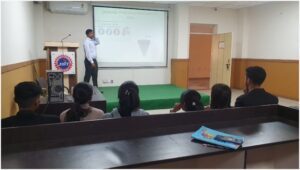 REPORT
REPORT
Event Name | Language Proficiency Enhancement skills |
Date | 20.11.2018 to 24.11.2018 |
Venue | Swami Vivekananda Hall |
Participated by | 164 |
Programme Coordinator | Mr. Manoj Chaudhary |
Programme Objective | The objective of the Language Mastery program“Language Proficiency Enhancement Skills” is to empower participants with the tools, techniques, and practice necessary to enhance their language proficiency and communication skills in a targeted language. |
About Event | Language proficiency enhancement refers to the process of improving one’s proficiency, skill, and command over a particular language. It involves developing a deeper understanding of the language’s grammar, vocabulary, pronunciation, writing, reading, and communication skills. language proficiency enhancement equips students with a versatile skill set that enhances their academic, personal, and professional lives, fostering cultural appreciation, effective communication, and a broader understanding of the world. In response, JB Institute of Technology conducted a training programon Language Proficiency Enhancement skillsfrom 20.11.2018 to 24.11.2018
Day 1 · Introduction to the importance of language proficiency and effective communication. · Assessing current language skills and setting goals for improvement. · Overview of language components: grammar, vocabulary, pronunciation, listening, speaking, reading, and writing. Day 2 · Deep dive into essential grammar rules and sentence structures. · Expanding vocabulary through contextual learning and word usage. · Language exercises and activities for hands-on practice.
Day 3 · Improving spoken fluency and pronunciation. · Enhancing active listening skills and understanding diverse accents. · Interactive dialogues, role-playing, and group discussions. Day 4 · Strategies for enhancing reading comprehension and speed. · Techniques for structuring and writing clear and coherent paragraphs. · Guided writing exercises and reading comprehension activities. Day 5 · Adapting language for different contexts and audiences. · Cross-cultural communication and idiomatic expressions. · Practical application: Simulated conversations, presentations, and real-life scenarios.
|
Programme Outcome | The outcomes collectively prepare students with the language proficiency and communication skills needed to excel in personal, academic, and professional contexts, fostering effective cross-cultural communication and contributing to personal and professional success. |
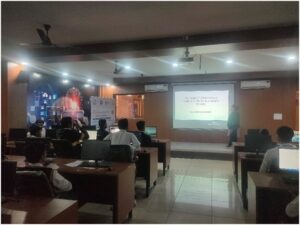 REPORT
REPORT
Event Name | Three days training program on 21st century skills and Steps in problem solving |
Date | 21.02.2023 to 23.02.2023 |
Participated by | 125 |
Programme Coordinator | Mr. Manoj Kumar Chaudhary |
Programme Content | Life Skills |
Programme Objective | 1. To familiarize participants with 21st-century skills essential for personal and professional success. 2. To provide practical training on effective problem-solving techniques. 3. To empower individuals with the skills to tackle complex challenges in a rapidly changing world. |
About Event | Day 1: Introduction to 21st Century Skills (February 21, 2023) – The program commenced with an introductory session on the importance of 21st-century skills in the digital age. – Participants engaged in discussions about critical thinking, creativity, communication, collaboration, and adaptability. – Renowned educators and industry experts delivered lectures on the significance of these skills in various domains. Day 2: Practical Problem-Solving Techniques (February 22, 2023) Day two focused on hands-on training in problem-solving techniques. – Workshops covered topics such as root cause analysis, brainstorming, decision-making, and structured problem-solving. – Participants actively engaged in real-world problem-solving scenarios, enhancing their practical skills. Day 3: Application and Certification (February 23, 2023) – The final day emphasized the application of 21st-century skills in problem-solving. – Participants worked on case studies and projects, applying the skills they had learned. The Three-Day Training Program on “21st Century Skills and Steps in Problem Solving” successfully achieved its objectives by equipping participants with essential skills and practical problem-solving techniques. The program not only empowered participants to navigate challenges effectively but also fostered a culture of innovation and adaptability within the institute. We extend our gratitude to all the trainers, participants, and organizers who contributed to the success of this program. We are confident that the knowledge and skills gained during this training will have a lasting positive impact on the personal and professional growth of our community. |
Programme Outcome | · Increased awareness among participants about the importance of 21st-century skills in personal and professional growth. · Enhanced practical skills in effective problem-solving. · Empowerment of participants with the knowledge and confidence to tackle complex challenges in a dynamic world. · Promotion of a culture of innovation, collaboration, and adaptability within the institute. |
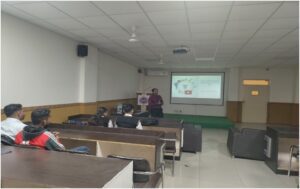 REPORT
REPORT
Event Name | Three days training program on First Aid |
Date | 26.10.2022 to 28.10.2022 |
Venue | Swami Vivekananda Hall |
Participated by | 125 |
Programme Coordinator | Mr. Manoj Kumar Chaudhary |
Programme Content | First Aid |
Programme Objective | 1. To educate participants about the importance of first aid in saving lives. 2. To provide practical training in basic first aid techniques and emergency response. 3. To empower individuals with the knowledge and skills to respond effectively to accidents and medical emergencies. |
About Event | Day 1: Introduction to First Aid (October 26, 2022) – The program commenced with an introductory session on the significance of first aid in emergency situations. – Participants engaged in discussions about the principles of first aid, including the ABCs (Airway, Breathing, Circulation). – Renowned medical professionals and experienced first responders delivered lectures on the essentials of first aid. Day 2: Practical First Aid Techniques (October 27, 2022) – Day two focused on hands-on training in various first aid techniques. – Workshops covered topics such as CPR (Cardiopulmonary Resuscitation), wound care, splinting, and basic life support. – Participants actively practiced these skills, gaining confidence in their ability to respond to emergencies effectively. Day 3: Emergency Response and Certification (October 28, 2022) – The final day emphasized emergency response and scenario-based training. – Participants learned how to assess emergency situations, prioritize actions, and coordinate with emergency services. The Three-Day Training Programme on First Aid successfully achieved its objectives by equipping participants with essential knowledge and practical skills related to first aid. The program not only empowered participants to respond effectively to emergencies but also fostered a culture of safety and preparedness within the institute. We extend our gratitude to all the trainers, participants, and organizers who contributed to the success of this program. We are confident that the knowledge and skills gained during this training will have a lasting positive impact on the safety and well-being of our community. |
Programme Outcome | · Increased awareness among participants about the importance of first aid in saving lives. · Enhanced practical skills in providing first aid in various emergency situations. · Empowerment of participants with the knowledge and confidence to respond effectively to accidents and medical emergencies. · – Promotion of a culture of safety and preparedness within the institute. |
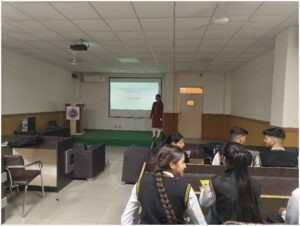 REPORT
REPORT
Event Name | Navigating Stress: Strategies for Resilience During and after COVID-19 |
Date | 07.03.2022 to 09.03.2022 |
Venue | Swami Vivekananda Hall |
Participated by | 116 |
Programme Coordinator | Mr. Punit Kumar |
Programme Content | Life Skills |
Programme Objective | 1. To raise awareness about the mental health challenges posed by the COVID-19 pandemic. 2. To provide practical tools and strategies for stress management and building resilience. 3. To promote a culture of well-being within the institute. |
About Event | Day 1: Understanding Stress and Resilience (March 7, 2022) – The workshop began with an in-depth discussion on the psychological impact of the COVID-19 pandemic and its associated stressors. – Participants engaged in interactive sessions exploring the concept of resilience and its role in coping with adversity. – Renowned psychologists and mental health experts delivered lectures on understanding stress and building resilience. Day 2: Practical Strategies for Stress Management (March 8, 2022) – Day two focused on practical strategies for stress management. – Workshops on mindfulness, meditation, and relaxation techniques were conducted. – Participants actively practiced stress reduction exercises and learned techniques to enhance emotional well-being.
Day 3: Building Resilience and Certification (March 9, 2022) – The final day emphasized building resilience and sustaining well-being in challenging times. – Participants were encouraged to develop personalized resilience plans. The “Navigating Stress: Strategies for Resilience During and after COVID-19” workshop successfully achieved its objectives by equipping participants with vital knowledge and practical skills related to stress management and resilience-building. The workshop not only empowered participants to cope with the psychological challenges of the pandemic but also fostered a culture of well-being and support within the institute. We extend our gratitude to all the trainers, participants, and organizers who contributed to the success of this workshop. We are confident that the knowledge and skills gained during this workshop will have a lasting positive impact on the mental health and resilience of our community. |
Programme Outcome | · Increased awareness among participants about the mental health challenges posed by the COVID-19 pandemic. · Enhanced practical skills in stress management and resilience-building. · Empowerment of participants with strategies to navigate stress during and after the pandemic. · Promotion of a culture of well-being and support within the institute. |
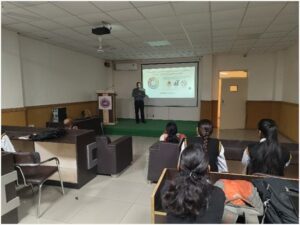 REPORT
REPORT
Event Name | Three Days Training Programme on Prevention of Non-Communicable Diseases |
Date | 22.09.2021 to 24.09.2021 |
Venue | Swami Vivekananda Hall |
Participated by | 116 |
Programme Coordinator | Mr. Punit Kumar |
Programme Content | Prevention of Non-Communicable Diseases |
Programme Objective | 1. To raise awareness among participants about the causes and consequences of non-communicable diseases. 2. To provide practical training on preventive measures, healthy lifestyles, and early detection of NCDs. 3. To empower individuals with the knowledge and skills to lead healthier lives and reduce NCD risk factors. |
About Event | Day 1: Understanding Non-Communicable Diseases (September 22, 2021) – The program commenced with an introductory session on the definition, types, and prevalence of NCDs. – Participants engaged in discussions about the risk factors, including poor diet, lack of physical activity, smoking, and excessive alcohol consumption. – Renowned health experts delivered lectures on the impact of NCDs on individual and community health. Day 2: Lifestyle and Prevention (September 23, 2021) – Day two focused on lifestyle modifications and preventive measures. – Workshops on healthy eating, physical activity, and smoking cessation were conducted. – Participants actively participated in discussions on creating and sustaining healthier habits.
Day 3: Early Detection and Certification (September 24, 2021) – The final day emphasized early detection and management of NCDs. – Participants learned about regular health screenings, risk assessment, and the importance of early intervention. – Participants received certificates of completion, recognizing their commitment to NCD prevention and health promotion. The Three-Day Training Programme on the Prevention of Non-Communicable Diseases successfully achieved its objectives by equipping participants with essential knowledge and practical skills related to NCD prevention, early detection, and healthy living. The program not only empowered participants to lead healthier lives but also encouraged them to promote a culture of health within the institute. We extend our gratitude to all the trainers, participants, and organizers who contributed to the success of this program. We believe that the knowledge and skills gained during this training will have a lasting impact on the well-being of our community. |
Programme Outcome | – Increased awareness among participants about the causes and consequences of NCDs. – Enhanced practical skills in adopting a healthier lifestyle. – Empowerment of participants with strategies for NCD prevention and early detection. – Promotion of a culture of health and well-being within the institute. |
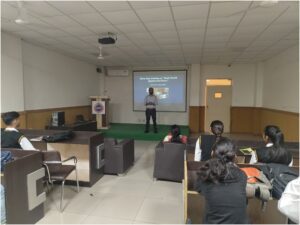 REPORT
REPORT
Event Name | Three days training on “Youth Health Hygiene and Stress” |
Date | 04.02.2021 to 06.02.2021 |
Venue | Swami Vivekananda Hall |
Participated by | 155 |
Organized by | JB Institute of Technology, Dehradun |
Programme Coordinator | Mr. Sumit Kumar |
Programme Content | Health Management & Nutrition |
Programme Objective | 1. To educate participants about the importance of cleanliness and hygiene in daily life. 2. To provide practical training in cleaning techniques, waste management, and personal hygiene. 3. To promote a culture of cleanliness and hygiene within the institute. |
About Event | Day 1: Introduction to Cleaning and Hygiene (October 6, 2020) – The program began with an introductory session on the significance of cleanliness and hygiene in preventing diseases and ensuring well-being. – Participants engaged in discussions on personal and environmental hygiene, focusing on their role in maintaining a healthy lifestyle. – Practical demonstrations on handwashing and proper waste disposal were conducted. Day 2: Practical Cleaning Techniques (October 7, 2020) – Day two was dedicated to hands-on training in various cleaning techniques for both personal and communal spaces. – Participants actively participated in workshops on effective cleaning of living spaces, offices, and public areas. – Emphasis was placed on the use of eco-friendly cleaning agents and best practices in waste management. Day 3: Personal Hygiene and Certification (October 8, 2020) – The final day emphasized personal hygiene practices and their role in preventing the spread of diseases. – Practical sessions on proper handwashing, dental care, and overall personal hygiene were conducted. – Participants received certificates of completion, recognizing their commitment to maintaining cleanliness and hygiene. The Three-Day Training Programme on Cleaning and Hygienic Factors successfully achieved its objectives by providing participants with essential knowledge and practical skills related to cleanliness and hygiene. The program not only empowered participants to lead healthier lives but also encouraged them to promote a culture of cleanliness within the institute. We extend our gratitude to all the trainers, participants, and organizers who contributed to the success of this program. We believe that the knowledge and skills gained during this training will have a lasting impact on the well-being of our community. |
Programme Outcome | – Increased awareness among participants about the importance of cleanliness and hygiene. – Enhanced practical skills in cleaning techniques and waste management. – Promotion of a culture of cleanliness and hygiene within the institute. – Participants equipped with the knowledge to lead healthier lives and maintain hygienic environments. |
 REPORT
REPORT
Event Name | Three days Training Programme on Cleaning and Hygienic Factors |
Date | 04.02.2021 to 06.02.2021 |
Venue | Swami Vivekananda Hall |
Participated by | 155 |
Programme Coordinator | Mr. Ujjwal |
Programme Content | Cleaning and Hygienic Factors |
Programme Objective | 1. To raise awareness among youth about the importance of physical and mental health. 2. To provide practical training on personal hygiene, stress management, and healthy living. 3. To empower youth with strategies to lead a balanced and stress-free life. |
About Event | Day 1: Youth Health Awareness (February 4, 2021) – The program began with an introductory session highlighting the importance of youth health. – Participants engaged in discussions about physical fitness, nutrition, and the impact of a healthy lifestyle on overall well-being. – Renowned health experts shared insights into maintaining good health and preventing common health issues among young individuals. Day 2: Personal Hygiene and Stress Management (February 5, 2021) – Day two focused on personal hygiene practices and stress management techniques. – Workshops on effective handwashing, dental care, and maintaining personal hygiene were conducted. – Stress management sessions included mindfulness, meditation, and coping strategies to deal with everyday stressors. Day 3: Healthy Living and Certification (February 6, 2021)** – The final day emphasized the importance of adopting a healthy and balanced lifestyle. – Participants learned about nutrition, exercise, and sleep as key components of a healthy life. – Participants received certificates of completion, recognizing their commitment to leading a healthy and stress-free life. |
Programme Outcome | – Increased awareness among participants about the importance of physical and mental health. – Enhanced practical skills in personal hygiene and stress management. – Empowerment of youth with strategies to lead a balanced and stress-free life. – Promotion of a culture of well-being within the institute. |
REPORT
Event Name | Three days Awareness Program on Role of Youth against Drug Abuse |
Date | 10.02.2020 to 12.02.2020 |
Venue | Swami Vivekananda Hall |
Participated by | 203 |
Organized by | JB Institute of Technology, Dehradun |
Programme Coordinator | Mr. Sumit Kumar |
Programme Content | Health Management & Nutrition |
Programme Objective | 1. To raise awareness among youth about the perils and consequences of drug abuse. 2. To empower young individuals with knowledge and skills to resist peer pressure related to drug use. 3. To foster a commitment among the youth to promote a drug-free and healthy lifestyle. |
About Event | Day 1: Understanding the Impact of Drug Abuse (February 10, 2020) – The program commenced with an insightful discussion about the prevalence and impact of drug abuse on individuals and society. – Participants engaged in interactive sessions, group discussions, and presentations that shed light on the physical, psychological, and societal consequences of drug addiction. – Renowned experts and individuals in recovery shared their personal stories, emphasizing the importance of prevention and recovery. Day 2: Building Resilience and Empowerment (February 11, 2020) – The second day focused on building resilience and empowering youth to make informed choices and resist peer pressure. – Workshops on effective communication, decision-making, and coping strategies were conducted. – Participants actively participated in team-building activities that promoted a sense of community and mutual support. Day 3: Advocating for a Drug-Free Future (February 12, 2020) – The final day underscored the role of youth as advocates for a drug-free society. – Participants were informed about local and national initiatives against drug abuse. – They were encouraged to develop and implement their anti-drug awareness projects in their respective communities. The Three-Day Awareness Program on the Role of Youth Against Drug Abuse achieved its objectives by equipping young individuals with the knowledge, skills, and motivation to combat drug abuse. The program fostered a sense of responsibility among participants to make informed choices and actively contribute to creating drug-free communities. We extend our heartfelt gratitude to all the speakers, participants, and organizers who contributed to the success of this program. We are confident that the knowledge and motivation gained during this program will continue to drive positive change in our society. |
Programme Outcome | – Increased awareness among youth about the severe consequences of drug abuse. – Enhanced knowledge and skills to resist peer pressure and make informed decisions. – Empowerment of youth to actively engage in advocating for a drug-free society. – The creation of a network of motivated young individuals committed to promoting a drug-free lifestyle. |
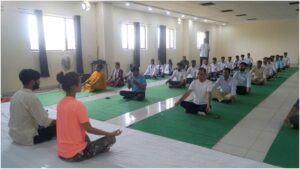 REPORT
REPORT
Event Name | Three Days Training Programme on Yoga Practice |
Date | 24.10.2019 to 26.10.2019 |
Venue | Swami Vivekananda Hall |
Participated by | 163 |
Programme Coordinator | Mr. Sumit Kumar |
Programme Content | Yoga Practice |
Programme Objective | 1. To introduce participants to the principles and philosophy of yoga. 2. To provide practical training in yoga asanas (postures) and pranayama (breathing exercises). 3. To emphasize the importance of yoga in promoting physical and mental well-being. |
About Event | Day 1: Introduction to Yoga (October 24, 2019) – The training programme commenced with an introductory session on the history, philosophy, and different branches of yoga. – Participants gained insights into the profound impact of yoga on mental and physical health. – Basic yoga asanas and their significance were discussed, setting the foundation for practical sessions. Day 2: Practical Yoga Sessions (October 25, 2019) – Experienced yoga instructors led practical sessions, guiding participants through various asanas and pranayama techniques. – Participants actively engaged in yoga practice, improving flexibility, strength, and mental focus. – Workshops on stress management and mindfulness through yoga were conducted, highlighting the practical benefits. Day 3: Advanced Asanas and Meditation (October 26, 2019) – The final day of the programme focused on advanced yoga asanas, deepening participants’ understanding and practice. – Meditation and relaxation techniques were introduced, emphasizing their role in enhancing mental clarity and overall well-being. – Participants received certificates of completion, recognizing their commitment to yoga practice. The Three-Day Training Programme on Yoga Practice was a resounding success, providing participants with a comprehensive understanding of yoga’s physical, mental, and spiritual dimensions. By introducing them to yoga philosophy and guiding them through practical exercises, we have empowered individuals to take control of their physical and mental health. We extend our sincere appreciation to our dedicated instructors, enthusiastic participants, and the organizing team for their contributions to the success of this programme. We remain committed to promoting holistic well-being within our institute and will continue to offer such enriching opportunities in the future. |
Programme Outcome | – Participants acquired a solid foundation in yoga philosophy and practical skills. – Improved physical flexibility, strength, and posture. – Enhanced mental focus, stress management, and mindfulness. – Increased awareness of the holistic benefits of yoga. – Encouragement to continue yoga practice for ongoing well-being. |
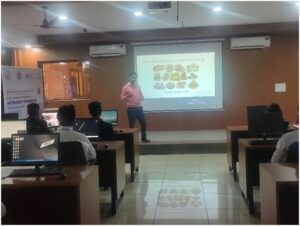 REPORT
REPORT
Event Name | Three days’ Workshop on Junk Food se Jung |
Date | 06.03.2019 to 08.03.2019 |
Venue | Computer Lab |
Participated by | 203 |
Organized by | JB Institute of Technology, Dehradun |
Programme Coordinator | Dr. Sandeep Kumar Chaudhary |
Programme Content | Health Management & Nutrition |
Programme Objective | 1. To raise awareness about the detrimental effects of junk food on health. 2. To promote the adoption of a balanced and nutritious diet among participants. 3. To encourage physical fitness and an active lifestyle. |
About Event | Day 1: Inauguration and Awareness Day (March 6, 2019) – The workshop began with an inaugural ceremony featuring prominent health experts who addressed the audience about the risks associated with excessive junk food consumption. – Participants gained insights into the importance of nutrition and the need for a shift towards healthier dietary choices. Day 2: Practical Workshops (March 7, 2019) – A series of interactive workshops were conducted, focusing on nutrition awareness and cooking demonstrations. – Professional chefs showcased the preparation of healthy and tasty meals, offering alternatives to popular junk food items. – Students actively participated in discussions and practical cooking sessions, enhancing their culinary skills while learning about nutritious food options. Day 3: Sports and Physical Fitness Activities (March 8, 2019) – The final day emphasized the significance of physical fitness in maintaining a healthy lifestyle. – Various sports events and outdoor activities were organized, encouraging participants to engage in regular physical exercise. – Yoga and meditation sessions promoted mental and physical well-being, emphasizing holistic health. The “Junk Food Se Jung” workshop served as an effective platform for promoting healthier lifestyle choices among our students, faculty, and staff. By educating participants about the risks of junk food and providing practical solutions for healthier living, we have taken a significant step towards cultivating a culture of health and well-being within our institute. We extend our appreciation to all the speakers, participants, and organizers for their valuable contributions to the success of this workshop. We remain committed to organizing similar events in the future to further enrich the lives of our campus community. |
Programme Outcome | – Increased awareness about the adverse effects of junk food. – Enhanced knowledge of nutrition and healthier eating habits. – Improved cooking skills, with an emphasis on nutritious meals. – Encouraged participation in physical fitness activities. – Fostering a culture of holistic well-being within the institute. |
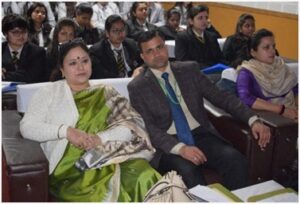 REPORT
REPORT
Event Name | Training Programme on Life Skills: Health Management & Nutrition |
Date | 18.10.2018 to 20.10.2018 |
Venue | Swami Vivekananda Hall |
Participated by | 203 |
Organized by | JB Institute of Technology, Dehradun |
Programme Coordinator | Mr. Manoj Kumar Chaudhary |
Programme Content | Health Management & Nutrition |
Programme Objective | To educate students about Health Management & Nutrition |
Programme Outcome | Students were trained how to keep themselves healthy with proper nutrition. |
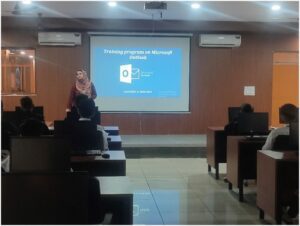
REPORT
Event Name | TrainingprogramonMicrosoftOutlook |
Date | 16.05.2023 to 18.05.2023 |
Venue | Computer Lab |
Organized by | JB Institute of Technology, Dehradun |
Participated by | 163 |
Program Coordinator(s) | Mr. Manoj Kumar Chaudhary |
Program Content | Computing Skills: TrainingprogramonMicrosoftOutlook |
Program Objective | To train the students about the advanced features of Microsoft Outlook |
Program Outcome | Students were trained to use advanced features of Microsoft Outlook in the education & industry. |
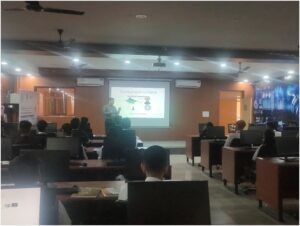 REPORT
REPORT
Event Name | Trainingprogram on Matlab |
Date | 24.11.2022 to 26.11.2022 |
Venue | Swami Vivekanand Hall |
Organized by | JB Institute of Technology, Dehradun |
Participated by | 163 |
Program Coordinator(s) | Mr. Sumit Kumar |
Program Content | Computing Skills: Trainingprogram on Matlab |
Program Objective | · Introduction to MATLAB: To familiarize participants with the MATLAB environment, interface, and basic functionalities. · Fundamental Programming Concepts: To introduce participants to fundamental programming concepts such as variables, data types, and operators. · Data Manipulation: To teach participants how to import, manipulate, and visualize data. · Scripting and Functions: To instruct participants on creating MATLAB scripts and functions. · Plotting and Visualization: To provide knowledge on creating plots and visualizations using MATLAB. |
Program Outcome | · Participants gained a solid understanding of the MATLAB environment and its basic functionalities. · Proficiency in programming concepts and data manipulation using MATLAB. · Ability to create scripts and functions to solve engineering and scientific problems. · Skills in data visualization and interpretation. |
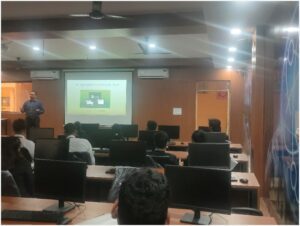 REPORT
REPORT
Event Name | TrainingProgrammeonMicrosoftExcel |
Date | 03.03.2022to 05.03.2022 |
Venue | Computer Lab |
Organized by | JB Institute of Technology, Dehradun |
Participated by | 99 |
Program Coordinator(s) | Mr. Manoj Kumar Chaudhary |
Program Content | Computing Skills: TrainingProgrammeonMicrosoftExcel |
Program Objective | To train the students about the advanced features of Microsoft MS Excel |
Program Outcome | Students were trained to use advanced features of Microsoft MS Excel in the education & industry. |
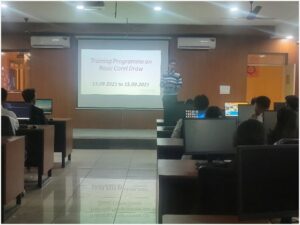 REPORT
REPORT
Event Name | Training Programmeon Basic Corel Draw |
Date | 13.09.2021to 15.09.2021 |
Venue | Computer Lab |
Organized by | JB Institute of Technology, Dehradun |
Participated by | 99 |
Program Coordinator(s) | Mr. Manoj Kumar Chaudhary |
Program Content | Computing Skills: TrainingProgrammeon Basic Corel Draw |
Program Objective | · Introduction to Corel DRAW: To introduce participants to the CorelDRAW software, its interface, and essential tools. · Vector Graphics: To familiarize participants with the concept of vector graphics and their advantages. · Basic Drawing Techniques: To teach participants how to create shapes, lines, and curves. · Text Manipulation: To instruct participants on working with text, fonts, and typography. · Color Management: To provide knowledge on color selection, gradients, and fills. · Object Manipulation: To teach participants how to arrange, group, and align objects. · Practical Projects: To apply acquired skills through hands-on design projects. |
Program Outcome | · Participants gained a solid understanding of Corel DRAW’s interface and essential tools. · Proficiency in creating vector graphics, basic shapes, and text-based designs. · Knowledge of color management and object manipulation techniques. · Application of learned skills through practical design projects. · Enhanced graphic design capabilities. |
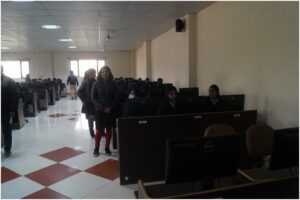 REPORT
REPORT
Event Name | TrainingprogramonTroubleshooting basic issues |
Date | 24.02.2021to 26.02.2021 |
Venue | Computer Lab |
Organized by | JB Institute of Technology, Dehradun |
Participated by | 92 |
Program Coordinator(s) | Mr. Manoj Kumar Chaudhary |
Program Content | Computing Skills: TrainingprogramonTroubleshooting basic issues |
Program Objective | To train the students about the advanced features of Photoshop |
Program Outcome | Students were trained to use advanced features of Photoshop in the education & industry. |
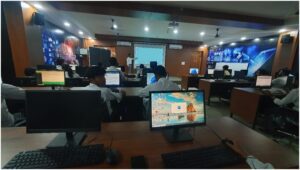 REPORT
REPORT
Event Name | TrainingprogramonPhotoshop |
Date | 04.11.2020 to 06.11.2020 |
Venue | Computer Lab |
Organized by | JB Institute of Technology, Dehradun |
Participated by | 92 |
Program Coordinator(s) | Mr. Manoj Kumar Chaudhary |
Program Content | Computing Skills: TrainingprogramonPhotoshop |
Program Objective | To train the students about the advanced features of Photoshop |
Program Outcome | Students were trained to use advanced features of Photoshop in the education & industry. |
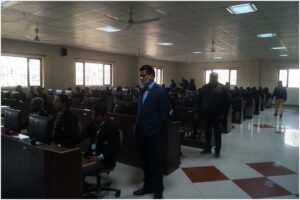 REPORT
REPORT
Event Name | Training program on Power Point |
Date | 10.03.2020 to 12.03.2020 |
Venue | Swami Vivekanand Hall |
Organized by | JB Institute of Technology, Dehradun |
Participated by | 148 |
Program Coordinator(s) | Mr. Manoj Kumar Chaudhary |
Program Content | Computing Skills: TrainingprogramonPower Point |
Program Objective | To train the students about the advanced features of Power Point |
Program Outcome | Students were trained to use advanced features of Power Point in the education & industry. |
 REPORT
REPORT
Event Name | TrainingprogramonUsing basic software applications |
Date | 14.11.2019 to 16.11.2019 |
Venue | Computer Lab |
Organized by | JB Institute of Technology, Dehradun |
Participated by | 152 |
Program Coordinator(s) | Mr. Manoj Kumar Chaudhary |
Program Content | Computing Skills: TrainingprogramonUsing basic software applications |
Program Objective | To train the students about the advanced features of Power Point |
Program Outcome | Students were trained to use advanced features of Power Point in the education & industry. |
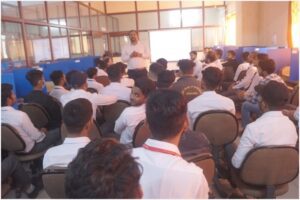 REPORT
REPORT
Event Name | Training programon setup and maintenance |
Date | 28.11.2018 to 30.11.2018 |
Organized by | JB Institute of Technology, Dehradun |
Participated by | 150 |
Program Coordinator(s) | Mr. Manoj Kumar Chaudhary |
Program Content | Computing Skills: TrainingprogramonMicrosoftOneNote |
Program Objective | To train the students about the advanced features of MicrosoftOneNote |
Program Outcome | Students were trained to use advanced features of MicrosoftOneNote in the education & industry. |
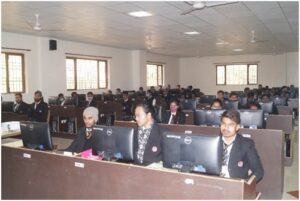 REPORT
REPORT
Event Name | TrainingProgramonMicrosoftOneNote |
Date | 22.01.2019 to 24.01.2019 |
Venue | Swami Vivekanand Hall |
Organized by | JB Institute of Technology, Dehradun |
Participated by | 150 |
Program Coordinator(s) | Dr. Sandeep Kumar Chaudhary |
Program Content | Computing Skills: TrainingprogramonMicrosoftOneNote |
Program Objective | To train the students about the advanced features of MicrosoftOneNote |
Program Outcome | Students were trained to use advanced features of MicrosoftOneNote in the education & industry. |
